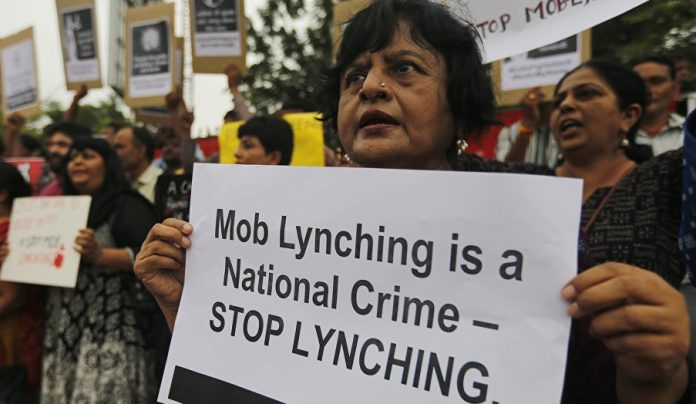– Mohd Naushad Khan
October 8, 2023: Senior advocate Colin Gonsalves urged the Supreme Court on Friday to order state governments to put compliance data, including that relating to the appointment of nodal officers, on their official websites, alleging that there has been governmental inaction notwithstanding the Tehseen Poonawalla judgment. Insensitivity of state governments towards mob lynching spells doubts on the implementation of SC judgment on lynching.
In its 2018 judgment in Tehseen S. Poonawalla case, the Supreme Court had directed the state governments to appoint a nodal officer in each district for taking measures to prevent incidents of mob violence and lynching.
“The Director General of Police/the Secretary, Home Department of the concerned states shall take regular review meetings (at least once a quarter) with all the Nodal Officers and State Police Intelligence heads,” the apex court had ordered.
On the insensitivity of many states towards the issue of mob lunching, Narender Nagarwal who teaches Law at the Delhi University, said, “It is disheartening to witness the continued failure of various State Governments to address the menace of mob lynching and hate speech effectively. The Supreme Court of India, in its landmark judgment, Tehseen Poonawala vs Union of India (2018) issued comprehensive guidelines aimed at preventing and combating these heinous acts.”
Nagarwal added, “These guidelines were not only legally binding but also represented a significant step towards curbing all sorts of cow vigilantism and ensuring the safety and security of all citizens, irrespective of their caste, creed, or religion. The consequences of this inaction are dire, as the incidents of mob lynching and hate speech have continued to rise, spreading fear and insecurity among vulnerable communities. It is the primary responsibility of the State Governments to protect their citizens and ensure that justice prevails. By failing to act promptly and decisively, these governments are failing in their duty to uphold the rule of law and protect the fundamental rights of every individual.”
However, according to John Dayal, a noted social and human rights activist who has investigated almost forty cases of lynching of Muslim youth, “The Tehseen Poonawala guidelines of the Supreme court were the first official acceptance by the government that targeted violence of this nature has started recurring in the country in the context of Hindutva mobilization and rampant Islamophobia. There is something sinister in a mob suddenly appearing and targeting mostly some innocent Muslim youth, and beating them to death. The excuse or pretext can be anything – from suspicion of carrying beef, or the meat of a cow, to eating prasad at a temple.”
Dayal further added, “My fear is that most state governments will say or pretend nothing special needs to be done for this crime as they are fully prepared to quell any violence. As it is, state governments do not want to keep any data on targeted religious violence against minorities in particular. But Poonawala guidelines are mere guidelines. Much more needs to be done. Training the police in secular values and holding police station heads, SHOs, and district police superintendents responsible, tougher with the district magistrate, may perhaps be more fruitful in stopping this very barbarous practice.”
Earlier, in a landmark judgment, the Supreme Court of India condemned the lynching incidents across the country. The Bench headed by then Chief Justice Dipak Misra said, “The horrendous acts of mobocracy cannot be permitted to inundate the law of the land. Earnest action and concrete steps have to be taken to protect the citizens from the recurrent pattern of violence which cannot be allowed to become the ‘new normal’. The State cannot turn a deaf ear to the growing rumblings of its People, since its concern, to quote Woodrow Wilson, “must ring with the voices of the people.” The exigencies of the situation require us to sound a clarion call for earnest action to strengthen our inclusive and all-embracing social order which would, in turn, reaffirm the constitutional faith. We expect nothing more and nothing less”.
Dr. Maskoor Ahmad Usmani, former President of AMU Students Union, said, “Since 2014, hate crimes particularly in the form of mob lynching has been exponentially escalated which has not only instilled fear among the Muslim community but also has tarnished our country’s image globally. This was a small yet first step from the court to curb such crimes. But there has been no support from many states in compliance with the court’s ruling. A very few states have appointed nodal officer, but majority has not. There are no data available on the same as well.”
Usmani added, “This shows the lack of will by the state governments in curbing such grave crimes. The vigilantes who are involved in such crimes have been provided impunity by the states. Not complying with such court directives manifests the clear nexus between these fringe groups and the people in government. This is a mockery of the supreme court rulings and democracy in our country by the respective state governments.”




